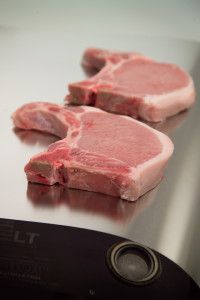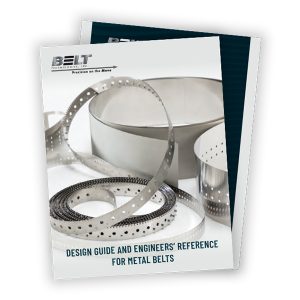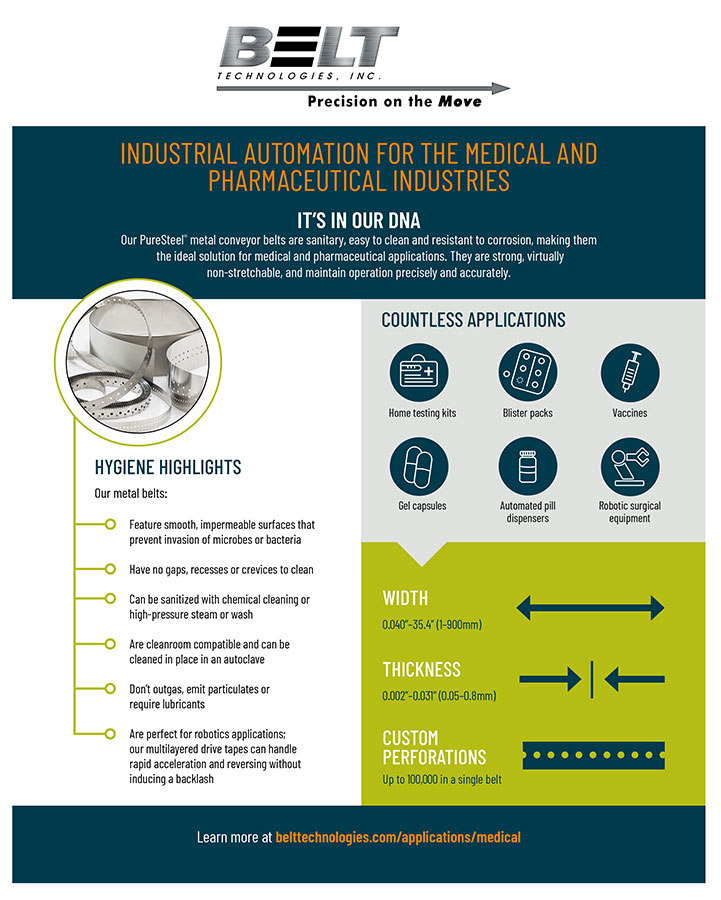 The food industry is one of the most diverse and sophisticated examples of conveyor automation. Machinery must be specially designed to accommodate the unique handling needs of a wide variety of food products, such as poultry, fish, baked goods, fruits, vegetables, dairy, and candy. Automated food-processing equipment must also fulfill the strict sanitary specifications of the Food and Drug Administration to prevent the spread of dangerous bacteria or infection.
The food industry is one of the most diverse and sophisticated examples of conveyor automation. Machinery must be specially designed to accommodate the unique handling needs of a wide variety of food products, such as poultry, fish, baked goods, fruits, vegetables, dairy, and candy. Automated food-processing equipment must also fulfill the strict sanitary specifications of the Food and Drug Administration to prevent the spread of dangerous bacteria or infection.
When choosing materials for the development of an automated food-processing conveyor system, there is no better alternative than stainless steel metal conveyor belts. Metal belts do not require lubrication, are resistant to chemicals, and will not affect the taste of the end product. They are also versatile, fitting easily into the design of any automated food-processing system and can be custom fabricated with special coatings or perforations, if required.
Metal Belts Perform in Extreme Temperatures
 The sanitation, cooking, and cooling methods by which food is processed make it crucial that all equipment be resilient to extreme temperatures. Metal belts have a lower thermal expansion coefficient, which enables them to easily retain their shape in high temperatures. This extends the lifespan and reliability of food-processing equipment. Unlike plastic belts, which may melt, warp, or break when exposed to high and low fluctuations in heat, metal belts are capable of withstanding a sudden drop or increase in temperature.
The sanitation, cooking, and cooling methods by which food is processed make it crucial that all equipment be resilient to extreme temperatures. Metal belts have a lower thermal expansion coefficient, which enables them to easily retain their shape in high temperatures. This extends the lifespan and reliability of food-processing equipment. Unlike plastic belts, which may melt, warp, or break when exposed to high and low fluctuations in heat, metal belts are capable of withstanding a sudden drop or increase in temperature.
Metal conveyor belts have the advantage over other conveyor materials for their ability to withstand extremes in temperature. Plastic belts cannot be exposed to temperatures higher than 100℃, however metal conveyor belts can be heated in excess of 121℃. Stainless steel belts will not be negatively affected by the high heat used in the cooking stage of certain food products, such as frozen pizzas or burger patties, and will transmit heat faster and more evenly for a better, more-consistently-cooked product.
Surpassing Sanitation Requirements for Food Conveyor Systems
 Outbreaks caused by poor food handling and insufficient sanitation procedures during processing can be a serious issue for automated food-processing facilities. The cost of recalling contaminated products and the danger those products pose to the lives of consumers necessitates cleanliness at all times on the food-processing floor. Thanks to their high-temperature resilience, stainless steel conveyor belts are capable of withstanding sanitation methods that use high heat and pressure to remove contaminants. They are also resistant to corrosion and will not be affected by strong chemicals such as chlorine, which may be used for cleaning purposes.
Outbreaks caused by poor food handling and insufficient sanitation procedures during processing can be a serious issue for automated food-processing facilities. The cost of recalling contaminated products and the danger those products pose to the lives of consumers necessitates cleanliness at all times on the food-processing floor. Thanks to their high-temperature resilience, stainless steel conveyor belts are capable of withstanding sanitation methods that use high heat and pressure to remove contaminants. They are also resistant to corrosion and will not be affected by strong chemicals such as chlorine, which may be used for cleaning purposes.
Plastic belts are susceptible to physical damage such as chips, scratches, or pits that can become hazardous havens for chemicals, contagions, or allergens. Stainless steel conveyor belts present a nonporous, sanitary surface that will not scratch or chip and can be heated well above the temperatures in which bacteria can survive.
Achieve Ultimate Precision and Reliable Results
Incorporating stainless steel conveyor belts into your automated food-processing system guarantees sanitary, efficient, and repeatable results. Automated conveyor systems using metal belts are hygienically designed to be easy to clean; sanitation does not require removal of the belt. The belts can also come with attachments for placement indexing. All stainless steel belts utilize stainless steel’s high temperature coefficient and corrosion-resistance—a twofold advantage that ensures long-term reliability.
The smooth, fast, and clean operations of stainless steel metal belts make them ideal for the automated food-processing industry. Our experienced engineers can help with the design of your automated system to ensure you get the results you need from your equipment. Belt Technologies, Inc. can design, fabricate, and assemble automated metal conveyor belt systems in any configuration, material, or coating you require. Call or submit a request for a quote online today!



